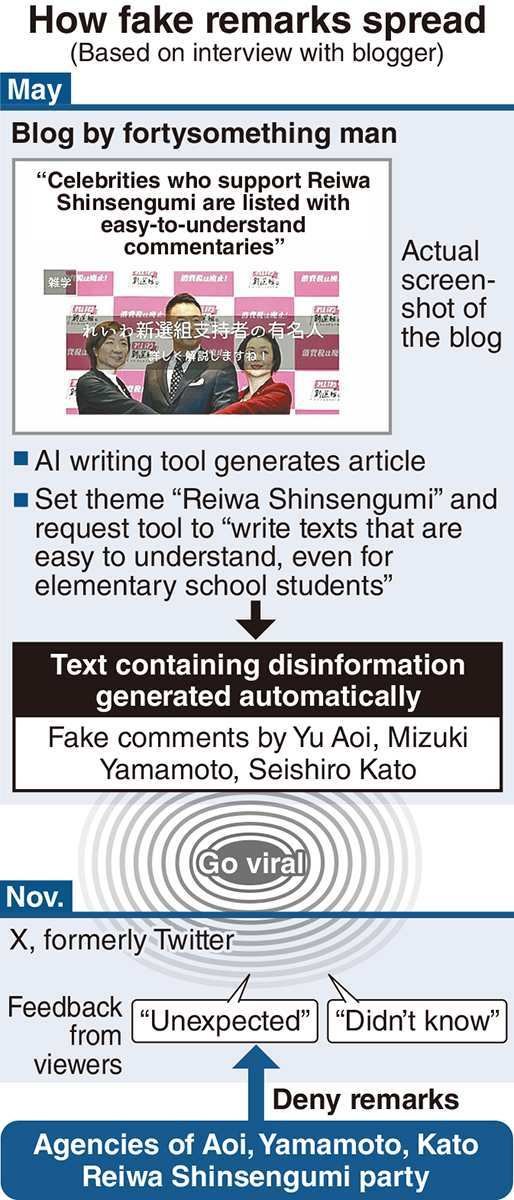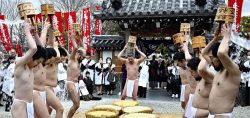2:00 JST, December 19, 2023
Fake endorsements by celebrities for the political party Reiwa Shinsengumi spread on social media last month, prompting their talent agencies to deny them. The fuss all started from texts made by generative AI on a blog containing the fake remarks being reposted on social media. The blogger apologized, saying that he did not pick out the celebrities intentionally and was unaware that AI could write lies.
Series of lies

The text in question was posted in May on the blog, titled ”Celebrities who support Reiwa Shinsengumi listed with easy-to-understand commentaries.”
The party is represented by Taro Yamamoto, who was an actor before becoming a Diet member. The blog read, “Celebrities from various fields support Reiwa Shinsengumi,” naming actresses Yu Aoi, Mizuki Yamamoto and actor Seishiro Kato. It contained quotes falsely attributed to them.
The blog “quoted” Aoi as saying, “I sympathize with the policies of Reiwa Shinsengumi. Taro-san is sincere in his attitude toward young people.”
As for Yamamoto’s, it read, “The reason I support Reiwa Shinsengumi is because of Taro-san’s personality,” and Kato’s read: “When I first worked with Taro-san, we discussed our mutual interest in politics. After that, I got to know Reiwa Shinsengumi and came to support them.”
Baselessness
In early November, these bogus comments were reposted on X — formerly Twitter — and went viral, shocking viewers, responding that they were “Unexpected” or “Surprising,” even though the comments were unfounded.
Regarding the political endorsements, Aoi’s talent agency announced on Nov. 9 on its website: “There is absolutely no basis in fact. We will take firm and resolute action.”
Yamamoto’s office also denied them by saying, “We feel strong indignation at the use of our name in content that is contrary to the facts,” while a staff member in Kato’s office posted on X, “There is no fact that he has made such a comment.”
Reiwa Shinsengumi posted on its website on Nov. 10, saying: “We are completely unaware of the content, and there is no such fact.”
AI-generated
The blogger, who is in his 40s living in western Japan, told The Yomiuri Shimbun that the texts on his blog, including the false comments, were created by generative AI. He apologized and deleted his entire blog.
The man said he was earning about ¥50,000 to ¥70,000 per month in advertising revenue from the website. The system was designed to make more revenue according to the view count. To produce content efficiently, since January the man had been using a commercially available AI writing tool, which can generate long sentences in about three minutes. He had posted about 10 articles a day.
Since posts containing the keyword “Reiwa Shinsengumi” were frequently read online, he set the party’s name as one of the themes of his posts. He instructed the AI to “write a long article that is easy for elementary school students to understand,” among other requests. The man himself neither supported nor criticized the party.
He admit that it was “by chance” that the false comments by the celebrities were in the post, saying that he did not select anyone in particular to write about.
“I deeply regret not checking the facts and posting machine-generated comments as they were,” he said.
Top Articles in Society
-

Producer Behind Pop Group XG Arrested for Cocaine Possession
-

Man Infected with Measles Reportedly Dined at Restaurant in Tokyo Station
-

Woman with Measles Visited Hospital in Tokyo Multiple Times Before Being Diagnosed with Disease
-

Bus Carrying 40 Passengers Catches Fire on Chuo Expressway; All Evacuate Safely
-

Tokyo Skytree’s Elevator Stops, Trapping 20 People; All Rescued (Update 1)
JN ACCESS RANKING
-

Producer Behind Pop Group XG Arrested for Cocaine Possession
-

Japan PM Takaichi’s Cabinet Resigns en Masse
-

Man Infected with Measles Reportedly Dined at Restaurant in Tokyo Station
-

Israeli Ambassador to Japan Speaks about Japan’s Role in the Reconstruction of Gaza
-

Videos Plagiarized, Reposted with False Subtitles Claiming ‘Ryukyu Belongs to China’; Anti-China False Information Also Posted in Japan

























